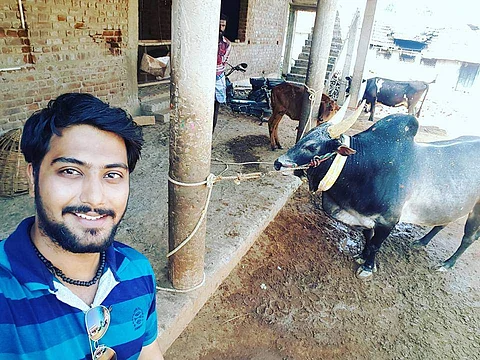

It'll soon be a year since the Jallikattu protests shook the country, but there were a lot of tremors before the quake struck and they started long before January 16. Different parts of the state had already been witnessing sporadic protests and Gowtham B is one of the few who was a part of the campaign much before it became a mass movement.
An artist by profession, Gowtham first got interested in the Jallikattu issue in 2016, much before HipHop Tamizha's 'Takaru Takaru' song release, which is believed to have played the catalyst in the uprising. "I have always been involved in social issues and when I started to learn about Jallikattu, it really interested me. On January 3, I released an art piece as well but we had the first protest on January 8, continued by a human chain on the 13th. It started with 300 people and went up to 500 people. I even travelled to Madurai where 20-30 people were arrested during the protest," he explained.
Gowtham along with other volunteers tried to sustain the movement and gathered more support for the cause, "By January 16, there was a lot of information and awareness that had spread to the general public, initially there were about a hundred people gathered at Vivekananda House. Within seconds another 100 joined, at the end of the day there were 5000 people," he added. Gowtham at that point was also an admin on the Chennai Memes page, which was one of the main Facebook pages that facilitated the protest and gathered momentum online which eventually translated on to the beach as well.
"Till the 16th we were shouting slogans against the ban but HipHop Tamizha suggested that it would be better if we instead said 'Amend PCA' and that's how we got the crowd to chant this, hoping that it would create more of an impact," he said. Then the crowds grew to thousands on the second day and eventually grew to lakhs on the third and fourth day. "It wasn't like anything I had seen before, it was so overwhelming," he recalled.
Gowtham spent all the days and nights at the protests, did he ever at any point think he wanted to go home? "If all your friends are on the beach and enjoying themselves, would you ever want to leave? If your loved ones are fighting for a cause why would you want to leave? Whatever we wanted was there, we had food, there were restrooms and we had each other. Also, the protesters were so clean and completely managed the garbage collection and disposal. One particularly great thing about the protest was that women felt secure and happy there. There were no cases of molestation or misbehaviour. That was the greatest part of the event," he explained.
The protesters were praised for maintaining so much calm and decorum throughout the protests but the way the protests ended was deplorable. How did the end turn out to be so devastating? "It was completely brutal and there was no need for things to become so bad. Honestly, if the protesters wanted to indulge in such activities they would have done it on the second or third day. Why would they maintain so much peace for six days then suddenly resort to violence," he said.
So a year later, what did he think of the massive protests that became a turning point in judicial history? "I don't think it could have happened anywhere else except for Tamil Nadu and I don't think we'll see an event like this ever again, at least not for the next 100 years. But it was all worth it, I had faith that we would succeed and we did. Now I feel like I I was part of something great," he answered. "At the end of the protests, I felt completely dead. I had no energy left in me and yet I packed my bags and went to Madurai to witness Jallikattu. And it was the best feeling," he said with a smile.
